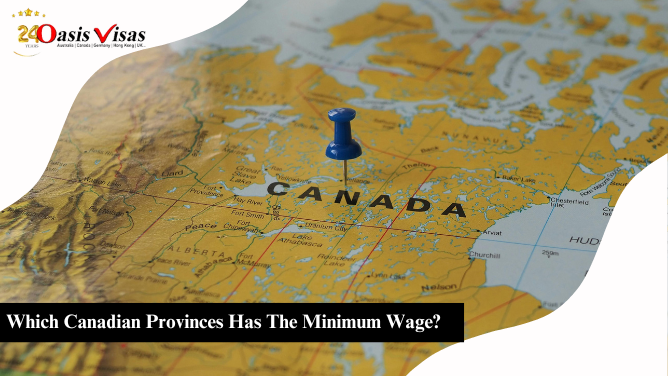
The Minimum wage is relevant in understanding individuals who intend to seek employment in Canada or a resident of this country. The wage is the lowest remuneration, per hour, which by law employees can get for their work. Each Canadian province has its own rate that might be different depending on a place of living.
Some provinces have higher rates to correspond to the cost of living, and others have lower ones. The importance of knowing wage is that it helps the worker be aware of their rights and gives a proper perspective into how much they can earn. This becomes quite helpful for persons trying to find their way into the job market or persons seeking a decision as to which Canadian province might suit them best when it comes to having an upper hand on wages.
Although the minimum wage does not promise an extravagant life, it reaches a certain standard of living whereby working people can earn decent compensation for their effort. Knowing how the wages change in the various provinces in Canada is very important because it may significantly affect one’s general financial health and quality of life. Whether you’re a student, a part-time worker, or in between jobs, knowing the wage empowers you to make better choices of places to live and work in Canada.
Provinces of Canada with Minimum Wage
Not all the provinces in Canada have the same minimum wage rate. Here are some of the main provinces and their minimum wage rates to date, in 2024:
- Ontario: Ontario ranks among the higher provinces in terms of minimum wage rates within Canada; workers will make $16.55 per hour. This is expected to increase further and try to pace itself with the ongoing inflation.
- State British Columbia: In British Columbia, the minimum wage stands at $16.75 per hour as of January 2023. It regularly indexes this amount against economic circumstances.
- Quebec: Quebec’s minimum wage is $15.25 per hour. It offers special wages for persons who may work in the food and beverage or hospitality industries where tips are normally expected.
- Alberta: Alberta’s minimum pay is $15.00 per hour. The living costs, though higher in some areas of the province, pay a bit lower compared to other provinces.
- Manitoba: Workers in Manitoba earn a minimum of $14.15 per hour. Compared to other provinces like British Columbia and Ontario, it has some relatively lower minimum pay.
- Nova Scotia: In Nova Scotia, the minimum wage is set to be $15.00 per hour. While this is a little lower compared to other provinces like Ontario, this does constitute a minimum level of income for employees.
- Saskatchewan: This province has one of the lowest minimum wages in Canada: $14.00 per hour. Some claim that this minimum wage should be higher for many workers, but the general cost of living also remains very low.
Wage and Its Effects on Workers
Wage is an important issue for many workers; it is even more important for those working part time or at entry levels. For some, it is the source of their primary income, while for others, it may be a temporary safety net until one gets a better-paying job. Minimum wage in most provinces in Canada reduces income inequality and gives employees a decent level of livelihood. It is, however, important not to look to the Low Wage as the answer when it itself can be meager at times to cover the barest of living expenses, especially in more expensive provinces.
For example, if one works in Ontario or British Columbia, two of the most expensive provinces to live in, even those employees on low wage will find it very difficult to pay rent, utilities, and basic needs. In these cases, some workers have to rely on other jobs or state subsidies to augment their incomes. In other provinces where the level of living is low, the wage may not be that much of a burden because workers can still afford to pay for their basic needs and not be in too much financial distress.
Why Minimum Wage Varies by Province
There are a number of reasons why the minimum wage is different depending on the province of Canada. One of the more common reasons is the cost of living. Major provinces, such as British Columbia and Ontario, where the cost of living is somewhat high, offer higher wages to help workers try to pay the increased price of rent, food, and other items. On the other hand, other provinces, such as Manitoba and Saskatchewan, are able to get away with low minimum wages due to the relatively low costs of living within these provinces.
Another factor is the condition of the local economy. For example, provinces which have been promoting a significant industry, such as Alberta and its oil and gas resources, may pay higher wages overall, including its minimum wage. On the opposite end of the scale, a province with very few apparent economic opportunities may have lower wages due to a more sluggish economy.
The Future of Lowest Wage in the Provinces of Canada
Because living costs are growing day by day and conditions keep on changing, the minimum wage in Canada is likely to continue its evolution. Major provinces of Canada reconsider their wage laws from time to time and usually make changes that would keep their workers at bay with increased rates of inflation and other financial pressures. In some provinces, debates are on over raising the minimum wage even higher to reflect what it costs to live. It may also be the catalyst for future increases in wages in Ontario, British Columbia, and Alberta, as the cost of living is continually on an upward spiral in those provinces.
For the employees, these forthcoming changes will mean higher wages and increased financial stability. At the same time, updates regarding minimum wage legislation should be well noted, since the benefits derived can make all the difference in total earnings and the overall quality of life.
The wage plays a very pivotal role in the lives of many workers across the provinces of Canada. Even though the rate differs with each different province, the idea remains the same: to give workers what they need after hard work. Knowing your low wage, whether you work in Ontario, British Columbia, or Saskatchewan, will help you make better decisions on where to go and living on your money. Generally speaking, minimum wage law changes with the cost of living, and it must do so if Canada’s workers are going to have a decent standard of living.











